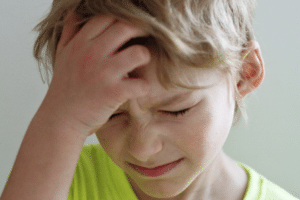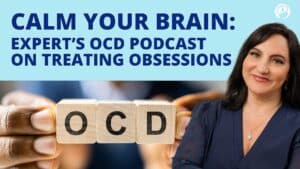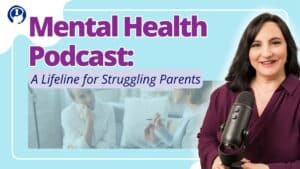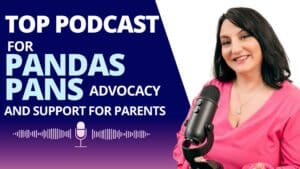A Path To OCD Recovery: Jenna's Story
Jenna, like an increasing number of children and teens, struggled with obsessive-compulsive disorder (OCD), a challenging mental illness characterized by obsessive thoughts and compulsive behaviors. For Jenna her story starts with having anxiety at a young age. Over time it morphed into fear driven avoidant behaviors and OCD.
Her parents tried many therapies and medication to no avail. It wasn’t until they calmed her brain with neurofeedback and found exposure and response prevention therapy (ERP) in our BrainBehaviorReset™ program that Jenna was able to stop OCD.
The journey towards recovery can seem daunting for family members watching their loved ones suffer. Jenna's success story, however, shines a light on the efficacy of natural therapies combined with ERP therapy. This blend of treatments provided Jenna, who once felt like the only person in the world with such intense anxiety, with a lifeline.
Understanding How OCD Affects the Brain
Obsessive-Compulsive Disorder (OCD) is a neurological disorder marked by serotonin imbalances, affecting mood and behavior. It involves changes in brain areas like the orbitofrontal cortex, impacting decision-making, and leads to characteristic intrusive thoughts and repetitive behaviors.
OCD creates a negative reinforcement cycle, where obsessions (like fear of germs) lead to compulsions (such as excessive hand washing) that temporarily relieve distress but reinforce the behavior. This cycle disrupts daily life and is particularly impactful on developing brains of children and teens, affecting emotional regulation and social interactions.
Recognizing OCD as a serious condition, not just a phase, is crucial for parents. Effective treatments like cognitive behavioral therapy and Exposure and Response Prevention (ERP) can help manage symptoms and break this cycle. Understanding OCD's biological basis is key to supporting recovery in children and guiding them towards appropriate treatment.
Learning How Anxiety is Different from OCD: Navigating Diagnosis and Support
Differentiating between anxiety and Obsessive-Compulsive Disorder (OCD) can be a challenging journey for many parents, often laden with confusion and frustration. Anxiety is a common, if not universal, experience; it’s our body’s natural response to stress, characterized by worry or fear about what’s to come. Children and teens, like adults, experience anxiety about real-world issues like exams, friendships, or family matters. This is a normal part of growing up.
OCD, however, can be a more complex and severe condition. It’s marked not just by anxiety, but by persistent, intrusive thoughts (obsessions) and repetitive behaviors (compulsions). These aren’t just ordinary worries about real-life issues but often irrational fears or rituals that can seem bizarre to outsiders. For example, a child with OCD might feel compelled to count to a specific number obsessively or repeat certain tasks in a precise manner to prevent something bad from happening, even though logically they know it makes no sense.
For parents, distinguishing between typical anxiety and OCD can be heart-wrenchingly difficult. It’s not uncommon for the journey to the right diagnosis to be long and winding, filled with misinterpretations and misdiagnoses. A child who is struggling with OCD might be initially seen as simply a worrier or a perfectionist. Their compulsions might be dismissed as quirky habits or a phase they’ll outgrow. In reality, these behaviors are not within the child's control and are driven by deep-seated fears and anxieties.
Understanding the nature of panic attacks in these conditions can also be helpful. In general anxiety, a panic attack might be triggered by an upcoming test or a social event. In OCD, a panic attack might occur because of an intrusive thought, like a sudden fear of contamination, leading to a frenzied series of compulsions, such as excessive hand washing. The panic in OCD is linked not just to the fear itself but to the terror of not completing the compulsions, which the individual believes are crucial to preventing disaster. It can lead to a limbic overload that results in a flood of cortisol.
Finding the right help adds another layer of complexity. There’s often a shortage of mental health professionals who specialize in treating children and teens, particularly those with OCD. This scarcity can lead to longer wait times for appointments and treatment, increasing the distress and anxiety for both the child and the family. Moreover, there’s a learning curve for parents in understanding which treatments are most effective for OCD, such as Exposure and Response Prevention therapy, which differs significantly from general anxiety treatments.
The emotional toll on families as they navigate this maze can be substantial. It involves a mix of worry, guilt, frustration, and sometimes a feeling of helplessness. Watching a child suffer with obsessive thoughts and compulsions, not knowing how to help or where to turn, can be one of the most challenging experiences for a parent. It’s a journey that requires immense patience, understanding, and often, a fight for the right diagnosis and treatment.
For parents, this knowledge is key to supporting their child, advocating for their needs, and helping them navigate the often complex path to recovery. OCD isn’t treatment resistant when we have the right diagnosis and path to both calming the brain and addressing the behavior.
Finding Root Causes That Contributed to OCD
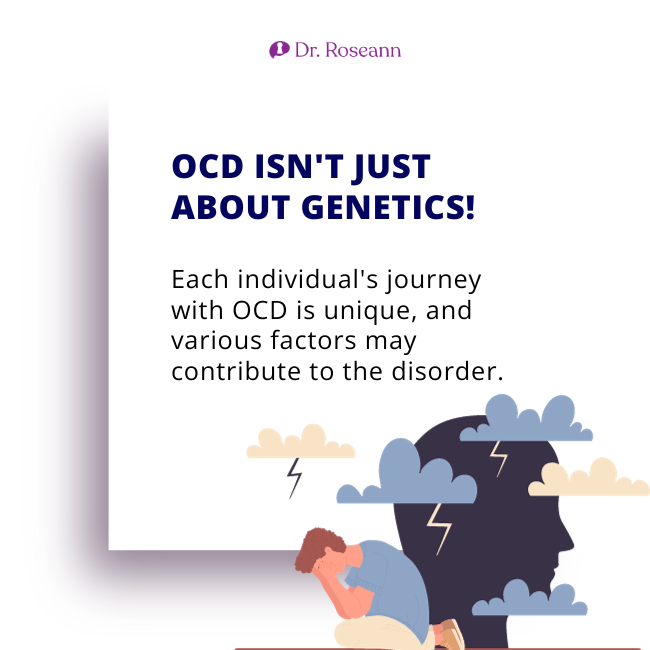
For some, genetics play a role; for others, environmental factors such as stressful life events, inflammation, chronic stress or even infections can trigger OCD symptoms.
Identifying these root causes is crucial in tailoring the treatment plan. In Jenna's case, a combination of genetic predisposition and school-related stress contributed to her OCD.
By digging deeper into those root causes we were able to put together a plan that supported cutting that excessive neurotransmitter activity with nutrition, exercise, supplements and PEMF.
Calming OCD in the Brain and Central Nervous System
Natural therapies that calm the brain have shown promise in helping with OCD. Techniques such as neurofeedback, PEMF, essential oils, supplements, somatic techniques and meditation can reduce stress and anxiety, thereby alleviating some OCD symptoms.
These practices help in regulating the brain's response to obsessive thoughts, making them less overwhelming. They also improve overall mental health awareness, making it easier for individuals to recognize and address their OCD symptoms.
For Jenna, magnesium had an immediate effect. She added magnesium L-threonate and L-glycinate, which are designed to support the brain and cut excitatory neurotransmitter activity. This one step helped her to be regulated enough to tackle being exposed to her intrusive and obsessive thoughts.
Learning How to Talk Back to OCD: Exposure and Response Prevention
Exposure and Response Prevention (ERP), a type of Cognitive Behavioral Therapy (CBT), is a highly effective treatment for OCD. This therapy involves gradually exposing the individual to their fear in a controlled setting, without allowing them to perform their usual compulsive behavior. Over time, this reduces the anxiety associated with the obsessive thought.
For Jenna, ERP meant confronting her fears directly, which initially increased her anxiety. However, with consistent practice and the support of her therapist, she learned to manage her responses, eventually finding that the weight was lifted off her shoulders. And with her parents getting support in the ERP process, they got the right words to support her.
Jenna's story is a testament to the power of combining natural brain-calming methods with behavioral therapy like ERP. This integrated approach addresses both the physiological and psychological aspects of OCD, offering a holistic path to recovery.
For parents of children and teens struggling with OCD, understanding that OCD is a complex mental illness requiring a multifaceted treatment approach is crucial. Natural therapies such as supplements, magnesium, essential oils, PEMF and neurofeedback can complement traditional treatments, offering a gentle, non-pharmaceutical method to help soothe the brain and reduce symptoms. When combined with ERP, these methods can significantly improve outcomes, leading to a successful recovery.
Jenna also got a 504 plan for her OCD at school. This gave her school accommodations that made her teachers not just aware of her OCD and how it impacted her with perfectionistic tendencies that prevented her from turning work in on time, but gave clear modifications to support her.
Jenna's journey illustrates that with the right support and treatment, OCD sufferers can reclaim their lives. It's a journey of resilience, hope, and ultimately, triumph over the challenges posed by this mental illness. As awareness about mental health continues to grow, stories like Jenna's offer hope and guidance for others navigating the complex world of OCD.
Citations:
Huey, E. D., Zahn, R., Krueger, F., Moll, J., Kapogiannis, D., Wassermann, E. M., & Grafman, J. (2008). A psychological and neuroanatomical model of obsessive-compulsive disorder. The Journal of neuropsychiatry and clinical neurosciences, 20(4), 390–408. https://doi.org/10.1176/jnp.2008.20.4.390
Mahjani, B., Bey, K., Boberg, J., & Burton, C. (2021). Genetics of obsessive-compulsive disorder. Psychological medicine, 51(13), 2247–2259. https://doi.org/10.1017/S0033291721001744
Sowden, E., Robinson, D., Lovell, K., Bee, P., Fulwood, A., Lidbetter, N., Wilson, Z., Brown, A., & Pedley, R. (2023). Understanding the support needs of parents of children with obsessive-compulsive disorder: a qualitative descriptive study in the UK. BMC psychiatry, 23(1), 309. https://doi.org/10.1186/s12888-023-04637-8
Are you looking for SOLUTIONS for your struggling child or teen?
Dr. Roseann and her team are all about science-backed solutions, so you are in the right place!
Grab your complimentary copy of
147 Therapist-Endorsed Self-Regulation Strategies for Children: A Practical Guide for Parents
You can get her books for parents and professionals, including: It’s Gonna Be OK™: Proven Ways to Improve Your Child’s Mental Health, Teletherapy Toolkit™ and Brain Under Attack: A Resource For Parents and Caregivers of Children With PANS, PANDAS, and Autoimmune Encephalopathy.
If you are a business or organization that needs proactive guidance to support employee mental health or an organization looking for a brand representative, check out Dr. Roseann’s professional speaking page to see how we can work together.
Dr. Roseann is a Children’s Mental Health Expert and Licensed Therapist who has been featured in/on hundreds of media outlets including The Mel Robbins Show, CBS, NBC, PIX11 NYC, Today, FORBES, CNN, The New York Times, The Washington Post, Business Insider, Women’s Day, Healthline, CNET, Parade Magazine and PARENTS. FORBES called her, “A thought leader in children’s mental health.”

She coined the terms, “Re-entry panic syndrome” and “eco-anxiety” and is a frequent contributor to media on mental health.
Dr. Roseann Capanna-Hodge has three decades of experience in working with children, teens and their families with attention-deficit hyperactivity disorder (ADHD), autism, concussion, dyslexia and learning disability, anxiety, Obsessive Compulsive Disorder (OCD), depression and mood disorder, Lyme Disease, and PANS/PANDAS using science-backed natural mental health solutions such as supplements, magnesium, nutrition, QEEG Brain maps, neurofeedback, PEMF, psychotherapy and other non-medication approaches.
She is the author of three bestselling books, It’s Gonna Be OK!: Proven Ways to Improve Your Child's Mental Health, The Teletherapy Toolkit, and Brain Under Attack. Dr. Roseann is known for offering a message of hope through science-endorsed methods that promote a calm brain.
Her trademarked BrainBehaviorResetⓇ Program and It’s Gonna be OK!Ⓡ Podcast has been a cornerstone for thousands of parents facing mental health, behavioral or neurodevelopmental challenges.
She is the founder and director of The Global Institute of Children’s Mental Health, Neurotastic™Brain Formulas and Dr. Roseann Capanna-Hodge, LLC. Dr. Roseann is a Board Certified Neurofeedback (BCN) Practitioner, a Board Member of the Northeast Region Biofeedback Society (NRBS), Certified Integrative Mental Health Professional (CIMHP) and an Amen Clinic Certified Brain Health Coach. She is also a member of The International Lyme Disease and Associated Disease Society (ILADS), The American Psychological Association (APA), Anxiety and Depression Association of America (ADAA) National Association of School Psychologists (NASP), International OCD Foundation (IOCDF).
© Roseann-Capanna-Hodge, LLC 2023




